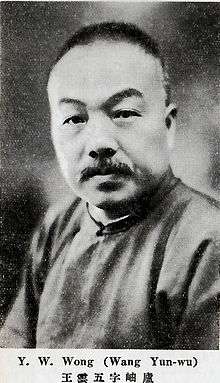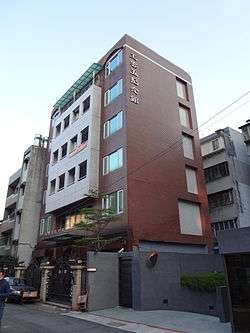Wang Yun-wu
Wang Yun-wu ([wǎŋ y̌n ù]; Chinese: 王雲五; pinyin: Wáng Yúnwǔ; July 9, 1888 – August 14, 1979)[1] was born 1888 in Shanghai and was a famous Chinese scholar of history and political science, he was also a politician and invented Shih Chiao Hao Ma, a method of Chinese lexicography also sometimes referred to as the Four Corner Method.
Wang Yun-wu 王雲五 | |
|---|---|
 | |
| Vice Premier of the Republic of China | |
| In office 15 July 1958 – 16 December 1963 | |
| Premier | Chen Cheng |
| Preceded by | Huang Shao-ku |
| Succeeded by | Yu Ching-tang |
| Minister of Finance of the Republic of China | |
| In office 1 June 1948 – 15 November 1948 | |
| Preceded by | Yu Hung-chun |
| Succeeded by | Hsu Kan |
| Personal details | |
| Born | 9 July 1888 Shanghai, Qing Dynasty |
| Died | 14 August 1979 (aged 91) Taipei, Taiwan |
| Nationality | Republic of China |
| Occupation | Scholar, Editor, Politician |
Career
In the 1920s when Wang Yun-wu was the editor in chief at The Commercial Press, one of the oldest book enterprises in China, he invented the Four Corner Method.
On May 31, 1948, during the Chinese Civil War, he was appointed by Chiang Kai-shek to lead the Ministry of Finance. After the Chinese Civil War he moved to Taipei with his family.
In 1972 Wang Yun-wu presided over the Memorial Hall's opening on behalf of the government.
On August 14, 1987, to commemorate his historical achievement his picture (as above) was placed on the NT$2 Stamp of which 4 million units were printed in the Republic of China (also known as Taiwan).
External links
| Wikimedia Commons has media related to Wang Yun-wu. |
- The Wang Yun-wu commemorative stamp
- Wang Yun-wu presiding over the Memorial Hall's inaugural ribbon-cutting ceremony
- Straddling East and West: Lin Yutang, a modern literatus: the Lin Yutang family collection of Chinese painting and calligraphy, an exhibition catalog from The Metropolitan Museum of Art Libraries (fully available online as PDF), which contains material on Wang Yun-wu (see table of contents)

